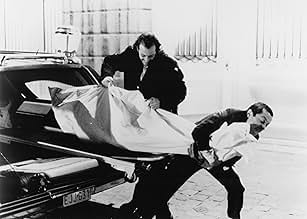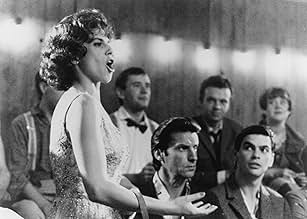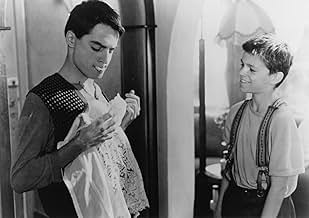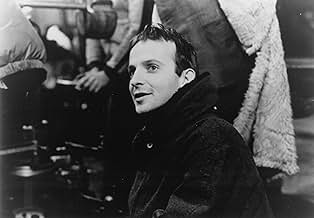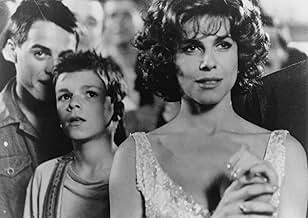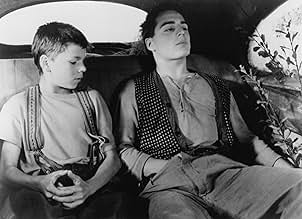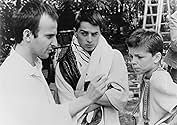IMDb RATING
6.7/10
1.5K
YOUR RATING
Harry Voss' life spans three pivotal days: his carefree youth, high school graduation, and lonely middle age, exploring life's fleeting moments and unfulfilled dreams.Harry Voss' life spans three pivotal days: his carefree youth, high school graduation, and lonely middle age, exploring life's fleeting moments and unfulfilled dreams.Harry Voss' life spans three pivotal days: his carefree youth, high school graduation, and lonely middle age, exploring life's fleeting moments and unfulfilled dreams.
- Director
- Writers
- Stars
- Awards
- 7 wins total
Stanley Duchateau
- Théo
- (as Stan Duchateau)
- …
- Director
- Writers
- All cast & crew
- Production, box office & more at IMDbPro
Featured reviews
This movie shows the life of Harry Voss, from being a child with a romantic vision of the world to becoming a frustrated alcoholic. Only the third part is based on the short story "The copulating mermaid of Venice, California" by Charles Bukowski. But its development is so intense that it required two other chapters in order to make it even more meaningful. It mixes nice and entertaining images with black, depressing scenes and the end might not be everybody's taste. As one of the songs of the movie puts it, love hurts but it can also kill. Although the film can be funny at times it is mainly sad and it will not leave any spectator indifferent.
Crazy Love (1987), directed by Belgian filmmaker Dominique Deruddere, holds a unique place in cinematic history as the first Flemish-Belgian film to hit theaters in North America. Adapted from Charles Bukowski's controversial short story "The Copulating Mermaid of Venice, California," the film sparked significant debate, particularly in the United States, due to its provocative subject matter.
In the 80s, Madonna, Sean Penn, and Francis Ford Coppola, all close to Bukowski at the time, championed the film's release, but ultimately it failed to achieve the expected box office success.
However, the film's exceptional cinematography and the actors' remarkable performances have solidified its position among the best and most epic Bukowski adaptations. When Netflix introduced the film to a wider audience in early 2020, the world had changed, and the film finally attained its well-deserved cult status.
The film's visual style, crafted by cinematographer Willy Stassen, is a gritty and unflinching portrayal of the underbelly of Belgian society, mirroring the raw and often disturbing nature of Bukowski's writing. The performances, particularly Josse De Pauw's portrayal of Harry Voss across three different stages of his life, are nuanced and captivating, capturing the essence of Bukowski's anti-hero.
While the film may have been ahead of its time in 1987, its themes of love, obsession, and self-destruction remain as relevant as ever. The film's unflinching honesty and dark humor resonate with audiences who appreciate Bukowski's unique brand of storytelling.
"Crazy Love" is a testament to the enduring power of Bukowski's work and the ability of cinema to transcend cultural boundaries and provoke thought. It is a film that deserves to be discovered and rediscovered by new generations of viewers.
In the 80s, Madonna, Sean Penn, and Francis Ford Coppola, all close to Bukowski at the time, championed the film's release, but ultimately it failed to achieve the expected box office success.
However, the film's exceptional cinematography and the actors' remarkable performances have solidified its position among the best and most epic Bukowski adaptations. When Netflix introduced the film to a wider audience in early 2020, the world had changed, and the film finally attained its well-deserved cult status.
The film's visual style, crafted by cinematographer Willy Stassen, is a gritty and unflinching portrayal of the underbelly of Belgian society, mirroring the raw and often disturbing nature of Bukowski's writing. The performances, particularly Josse De Pauw's portrayal of Harry Voss across three different stages of his life, are nuanced and captivating, capturing the essence of Bukowski's anti-hero.
While the film may have been ahead of its time in 1987, its themes of love, obsession, and self-destruction remain as relevant as ever. The film's unflinching honesty and dark humor resonate with audiences who appreciate Bukowski's unique brand of storytelling.
"Crazy Love" is a testament to the enduring power of Bukowski's work and the ability of cinema to transcend cultural boundaries and provoke thought. It is a film that deserves to be discovered and rediscovered by new generations of viewers.
Rather effective three part tribute to Charles Bukowsi ( even if the first part is based on the semi autobiographical tale by his author of choice, Joe Fante). The middle section is more predictable than the others and all fairly shocking. The movie mixes music and tempos as well as mood to give just the right bitter sweet flavour with more than a hint of romanticism and drunkenness to give this the authentic air. The attempted initiation of the young boy, the acute acne humiliations and the necrophilia are all hard to take but the film is dressed well enough and a smile lingers despite it all. It also has to be said that the director has managed to convey a real sense of Bukowski's writings/life and that is no small feat in itself.
10andy-933
When it exploded onto screens in the mid 1980's, Oscar® nominated director
Dominique Deruddere's film CRAZY LOVE divided critics and audiences as few
films before or since.
Championed by Godfather director Francis Ford Coppola, the film was picked
up for US distribution. Stars like Madonna and Sean Penn attended the LA
premiere. But the films shocking subject matter and startling imagery were too rich a combination for audiences at the time. The film vanished from sight,
becoming an instant cult classic - much written about but seldom seen and now reappraised as one of the most underrated films of the 1980's.
Taking his cue from stories by cult American author Charles Bukowski,
Deruddere's film tells the story of a man's life via three nights, spread over 20 years. We see his hero, Harry Voss, first as a romantic young boy of 12, then as an acne ridden teenager, lost in unrequited love, and finally as a drink sodden drop out, for whom no act is too dreadful to contemplate...with terrible and yet deeply moving consequences.
It's a film that, once seen, is never likely to be forgotten. A film with a unique, bitter sweet and poetic mood that manages to be funny and tragic at the same
time. A minor masterpiece.
Dominique Deruddere's film CRAZY LOVE divided critics and audiences as few
films before or since.
Championed by Godfather director Francis Ford Coppola, the film was picked
up for US distribution. Stars like Madonna and Sean Penn attended the LA
premiere. But the films shocking subject matter and startling imagery were too rich a combination for audiences at the time. The film vanished from sight,
becoming an instant cult classic - much written about but seldom seen and now reappraised as one of the most underrated films of the 1980's.
Taking his cue from stories by cult American author Charles Bukowski,
Deruddere's film tells the story of a man's life via three nights, spread over 20 years. We see his hero, Harry Voss, first as a romantic young boy of 12, then as an acne ridden teenager, lost in unrequited love, and finally as a drink sodden drop out, for whom no act is too dreadful to contemplate...with terrible and yet deeply moving consequences.
It's a film that, once seen, is never likely to be forgotten. A film with a unique, bitter sweet and poetic mood that manages to be funny and tragic at the same
time. A minor masterpiece.
LOVE IS A DOG FROM HELL (a.k.a CRAZY LOVE) (Dominique Deruddere - Belgium 1987).
Three Bukowskian tales set in a Belgian, mostly rural, setting. How about that? Despite good reviews upon its release, winning several awards and getting support by Hollywood heavyweights Sean Penn and Francis For Coppola, the film vanished into obscurity almost immediately after its release. Perhaps it was bad timing, because Barbet Schroeder's star-studded BARFLY was released almost simultaneously. Who knows? By any chance, this film is a beauty, clearly deserving wider attention.
The film has a three-act construction, all set around the live of Harry Voss, focusing on his difficult search for love and affection. The first act is set in 1955 and follows Harry when he's twelve years old. He is struck by his first notions of true love when he sees a dream-like film in cinema, only to be helped out of his dream by a more mature friend who claims the only reason people get married is to get laid. Remember, it's fifties' rural Flanders we're talking here. In the second act, in the early sixties, Harry is a shy 19-year old, his face horribly disfigured by a grotesque form of acne. When driving in the bus, he is stared at by all the children, while the adults look away. There's a high school dance, but Harry can't get a girl. In the third act we get a more literal adaptation of Bukowsky's THE COPULATING MERMAID OF VENICE, CA., when Harry is a down-on-his-luck alcoholic, devoid of any aspirations, spending most of his time in shady bars. When he meets an old acquaintance, they go on a joined drinking binch and rehash old memories while patrolling the foggy streets. In their drunken frenzy ("for old time's sake") they decide to steal a body from an ambulance they see on a deserted street and take it to an abandoned house. This makes - how morbid it may sound - for one of the most beautiful and touching scenes of the film. The ending is a beauty.
In the first act the film starts of a bit slowly with some awkward moments. I found the second and third acts the strongest, but all three segments show remarkable cinematic harmony. Beginning and ending the film with nicely contrasted mirror images of "the Princess" running across some dimly lit corridor and Raymond van het Groenewoud's haunting musical theme, it makes for a very neat composition indeed. Cars also feature prominently in all three segments. Most of the key scenes take place in or around cars. It all a very American feel to it, especially the second act. A homecoming dance, a prom, lampoons, American cars, it's small town USA transferred to Belgium. The lead performance by Josse de Pauw who plays the adult Harry in the second and third acts, is a joy to watch.
All the more recommended, because of Mondo Macabro's excellent DVD-release. A bit of an oddity in their usual catalogue of all kinds of exploitational sewers of world cinema (which I often like, don't get me wrong), their treatment of the film is excellent, with a luminous new transfer and jam-packed with extras. Two documentaries, the "making-off" with some great footage of Bukowski and his thoughts on the film, a filmed interview with director Deruddere, a text essay on Flemish cinema, and Mondo Macabro's usual trailer reel of the wilder side of world cinema to top it all off. With an almost surrealist setting and touching subjects like necrophilia, it's not a film most audiences will embrace easily, but any fan of Bukowski, Belgian cinema or good cinema in general should really give this one a try. It might be a far cry from Bukowsky's usual settings but liberal interpretations usually make for far more interesting films. This is worth seeing. Damn, the man even approved of it himself!
Camera Obscura --- 9/10
Three Bukowskian tales set in a Belgian, mostly rural, setting. How about that? Despite good reviews upon its release, winning several awards and getting support by Hollywood heavyweights Sean Penn and Francis For Coppola, the film vanished into obscurity almost immediately after its release. Perhaps it was bad timing, because Barbet Schroeder's star-studded BARFLY was released almost simultaneously. Who knows? By any chance, this film is a beauty, clearly deserving wider attention.
The film has a three-act construction, all set around the live of Harry Voss, focusing on his difficult search for love and affection. The first act is set in 1955 and follows Harry when he's twelve years old. He is struck by his first notions of true love when he sees a dream-like film in cinema, only to be helped out of his dream by a more mature friend who claims the only reason people get married is to get laid. Remember, it's fifties' rural Flanders we're talking here. In the second act, in the early sixties, Harry is a shy 19-year old, his face horribly disfigured by a grotesque form of acne. When driving in the bus, he is stared at by all the children, while the adults look away. There's a high school dance, but Harry can't get a girl. In the third act we get a more literal adaptation of Bukowsky's THE COPULATING MERMAID OF VENICE, CA., when Harry is a down-on-his-luck alcoholic, devoid of any aspirations, spending most of his time in shady bars. When he meets an old acquaintance, they go on a joined drinking binch and rehash old memories while patrolling the foggy streets. In their drunken frenzy ("for old time's sake") they decide to steal a body from an ambulance they see on a deserted street and take it to an abandoned house. This makes - how morbid it may sound - for one of the most beautiful and touching scenes of the film. The ending is a beauty.
In the first act the film starts of a bit slowly with some awkward moments. I found the second and third acts the strongest, but all three segments show remarkable cinematic harmony. Beginning and ending the film with nicely contrasted mirror images of "the Princess" running across some dimly lit corridor and Raymond van het Groenewoud's haunting musical theme, it makes for a very neat composition indeed. Cars also feature prominently in all three segments. Most of the key scenes take place in or around cars. It all a very American feel to it, especially the second act. A homecoming dance, a prom, lampoons, American cars, it's small town USA transferred to Belgium. The lead performance by Josse de Pauw who plays the adult Harry in the second and third acts, is a joy to watch.
All the more recommended, because of Mondo Macabro's excellent DVD-release. A bit of an oddity in their usual catalogue of all kinds of exploitational sewers of world cinema (which I often like, don't get me wrong), their treatment of the film is excellent, with a luminous new transfer and jam-packed with extras. Two documentaries, the "making-off" with some great footage of Bukowski and his thoughts on the film, a filmed interview with director Deruddere, a text essay on Flemish cinema, and Mondo Macabro's usual trailer reel of the wilder side of world cinema to top it all off. With an almost surrealist setting and touching subjects like necrophilia, it's not a film most audiences will embrace easily, but any fan of Bukowski, Belgian cinema or good cinema in general should really give this one a try. It might be a far cry from Bukowsky's usual settings but liberal interpretations usually make for far more interesting films. This is worth seeing. Damn, the man even approved of it himself!
Camera Obscura --- 9/10
Did you know
- TriviaRegarded by Charles Bukowski as the most successful effort to bring his work to the screen.
- ConnectionsReferenced in Film Junk Podcast: Episode 548: Making a Murderer (2016)
- How long is Crazy Love?Powered by Alexa
Details
Box office
- Gross US & Canada
- $119,919
- Runtime1 hour 30 minutes
- Sound mix
- Aspect ratio
- 1.66 : 1
Contribute to this page
Suggest an edit or add missing content



